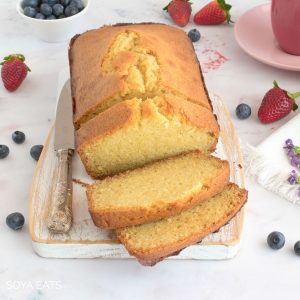
Vanilla Okara Pound Cake
Enjoy this easy-to-make moist and buttery vanilla okara pound cake, and serve it plain or topped with whipped cream and fruit for a tasty dessert. Or use it as a base for delicious desserts like trifles, French toast, bread pudding, or shortcakes.
ESTIMATED COST : $4.87 or $0.40 a serve
Equipment
- Kitchen scales
- Loaf tin 23 cm x 13 cm x 6 cm (9 inch x 5.11 inch x 2.36 inch) or a 20 cm (8 inches) round tin.
Ingredients
- 226 grams (½ pound) butter, room temp
- 226 grams (½ pound) of sugar
- 226 grams (½ pound) eggs, room temp, weigh, beat eggs, discard excess to get the correct weight
- 2 teaspoon vanilla
- 113 grams (¼ pound) of fresh okara
- 226 grams (½ pound) flour
- 1 teaspoon baking powder
- 1 teaspoon baking soda
Instructions
- Preheat the oven to 180°C (350°F). Grease and flour or line 23 cm x 13 cm x 6 cm (9 inch x 5.11 inch x 2.36 inch) loaf tin or a 20 cm (8 inches) round tin.
- Place butter and sugar in a mixing bowl and beat on a high-speed electric mixer until light and fluff. This will take about 5 - 8 minutes.
- Reduce the mixer speed to low and gradually add the eggs a little at a time, mixing well between each addition.
- Beat in the vanilla.
- Mix in the wet okara until evenly combined.
- In another bowl, sift together the flour, baking powder, and baking soda.
- Using a wooden spoon, gradually mix the flour into the batter until just incorporated.
- Transfer the batter to the prepared cake tin, smooth out the top and bake for about 40 – 50 minutes or until the top is golden and a toothpick inserted into the center comes out clean.
- Remove from the oven, and let it stand in the tin for about 15 minutes before transferring it to a wire rack to cool completely.
Notes
How to measure eggs by weight for baking
Here is how to measure eggs for a recipe using kitchen scales:
- Start by cracking 2-3 eggs into a small bowl or cup and beat them together.
- Place another bowl or cup on the kitchen scale and reset the scale to zero.
- Pour the beaten eggs out of the bowl or cup and into the bowl on the zeroed scales.
- Take note of the weight of the eggs on the scales, add more beaten eggs until you get the amount called for in the recipe, and if there is too much egg, remove some until you get the correct weight.
Nutrition Facts
Vanilla Okara Pound Cake
Serving Size
1 slice 1.8 cm (0.70 inches) thick
Amount per Serving
Calories
292
% Daily Value*
Fat
16
g
25
%
Saturated Fat
10
g
63
%
Monounsaturated Fat
4
g
Polyunsaturated Fat
1
g
Trans Fat
0
g
Cholesterol
59
mg
20
%
Sodium
274
mg
12
%
Potassium
52
mg
1
%
Carbohydrates
35
g
12
%
Fiber
1
g
4
%
Sugar
19
g
21
%
Protein
3
g
6
%
* Percent Daily Values are based on a 2000 calorie diet.